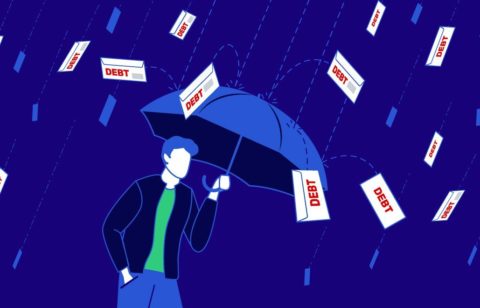We understand how tough it is to be several months behind on your bills with little or no hope of catching up. But it can be even more devastating to receive a call from a debt collector when a lender or creditor has charged off your debt and sold it to a collection agency. Being heavily in debt can take a considerable toll – both emotionally and physically. Financially, it can take a hit to your lifestyle and prevent you from even purchasing the essentials.
First: don’t panic
It is only human nature to panic when you hear a debt collector on the other end of the phone! But take a deep breath and relax; you do have rights. And keep in mind that the person has nothing against you personally, their job is to collect the money.
Since most debt collectors work on a commission basis, they have a huge incentive to collect. They may bluster and threaten you with all kinds of dire consequences, like calling your employer or family members. By doing this, they are breaking the law.
Debt collectors are limited by just how much they can intrude on your privacy and your life. Since receiving something is better than hanging up without a resolution, they will generally try to negotiate a deal. Try to keep your wits about you as you try landing on a fair price. Whatever you do, don’t ignore the creditor calling.
Your rights
Several years ago, Congress passed the Fair Debt Collection Practices Act. This law defines what a debt collector can and can’t do.
For example, they can’t …
- Call you before 8:00 a.m. or after 9:00 p.m.
- Disclose information about your debts to third parties (i.e., your family members or friends)
- Contact you after receiving written notification that you do not want to be contacted any further
- Call you repeatedly
- Accuse you of having committed a crime
- Use deceptive methods to collect debts
- Call you at inconvenient times/places
- Claim to be affiliated with any governmental organization
- Use profane/abusive language
- Misrepresent the character, amount, or legal status of a debt
- Threaten to take any illegal action
- Threaten to communicate false credit information
- Refuse your request for all paperwork related to your debt, including itemized statements, contracts, and invoices.
If you believe a debt collector is engaged in any of the above practices, you could hire a lawyer and sue the agency for damages. You might be able to collect as much as $1000 per incident.
The debt devil is in the details
When a collector calls you, the first thing you should do is ask for the name of the original creditor, the exact amount you owe, and how you could dispute the debt or have it verified. All collectors need to provide you with your billing information in writing within five days after first contact. If you don’t believe you owe this debt or need to dispute the amount, list your refusal or disagreement in writing within 30 days of receiving the information.
If you do dispute the debt, the debt collector can’t contact you again until they have investigated your request and verified the information in a written rebuttal.
By making this request in writing within 30 days, the collector must stop all collection activities until they have provided you with the information. If you do decide to dispute the debt or request the name and address of the original creditor, be sure to keep a copy of the information for your file.
Put a stop to all calls
You will need to speak with a debt collector at least once to see if you can resolve the matter. Even if you don’t think the debt is yours, you can’t pay it off, or the collector has contacted you by mistake, a conversation is mandatory. If you decide after that initial conversation that you don’t wish to receive any more calls, you can write a cease and desist letter to stop all contact.
To further protect yourself, send the letter by certified mail and pay for a “return receipt” to prove the collector received it. After that, the collector is legally forbidden to contact you again with two exceptions: to confirm they won’t contact you again or to inform you of their next course of action – such as filing a lawsuit.
To be clear, you still owe the debt if the charge is valid. But following the above steps may at least get the collector off your back. Please note that sending a letter doesn’t guarantee that the collector will accept it, even if you sent it with “return receipt required.” In the end, the debt collector’s goal and financial incentive is to collect what you owe. Therefore, they will do anything lawfully permitted to do so.
Negotiating with your collector
A debt collector will never tell you this cold hard truth: their agency bought your debt for much less than you actually owe. In fact, the big credit card companies usually bundle their debts and sell them off to collection agencies for pennies on the dollar. That $750 debt the collector has contacted you about may have cost the agency $25 or less. This leaves a lot of wiggle room for you to negotiate a lower amount. The older the debt, the more likely it is that your collector will agree to settle.
Let National Debt Relief Help You
A better way to deal with creditors is by not putting yourself in a position to interact with them. A National Debt Relief debt coach can help you pay off your debt for less than you owe, in a shorter amount of time. They will also show you tips and tricks on sticking to a budget and remaining debt free.







